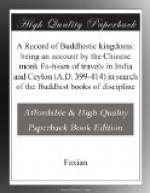the ship to the north-west, looking out for land;
and after sailing day and night for twelve days, they
reached the shore on the south of mount Lao,(8) on
the borders of the prefecture of Ch’ang-kwang,(8)
and immediately got good water and vegetables.
They had passed through many perils and hardships,
and had been in a state of anxious apprehension for
many days together; and now suddenly arriving at this
shore, and seeing those (well-known) vegetables, the
lei and kwoh,(9) they knew indeed that it was the
land of Han. Not seeing, however, any inhabitants
nor any traces of them, they did not know whereabouts
they were. Some said that they had not yet got
to Kwang-chow, and others that they had passed it.
Unable to come to a definite conclusion, (some of them)
got into a small boat and entered a creek, to look
for some one of whom they might ask what the place
was. They found two hunters, whom they brought
back with them, and then called on Fa-hien to act as
interpreter and question them. Fa-hien first spoke
assuringly to them, and then slowly and distinctly
asked them, “Who are you?” They replied,
“We are disciples of Buddha?” He then asked,
“What are you looking for among these hills?”
They began to lie,(10) and said, “To-morrow
is the fifteenth day of the seventh month. We
wanted to get some peaches to present(11) to Buddha.”
He asked further, “What country is this?”
They replied, “This is the border of the prefecture
of Ch’ang-kwang, a part of Ts’ing-chow
under the (ruling) House of Tsin.” When
they heard this, the merchants were glad, immediately
asked for (a portion of) their money and goods, and
sent men to Ch’ang-kwang city.
The prefect Le E was a reverent believer in the Law
of Buddha. When he heard that a Sramana had arrived
in a ship across the sea, bringing with him books
and images, he immediately came to the seashore with
an escort to meet (the traveller), and receive the
books and images, and took them back with him to the
seat of his government. On this the merchants
went back in the direction of Yang-chow;(12) (but)
when (Fa-hien) arrived at Ts’ing-chow, (the
prefect there)(13) begged him (to remain with him)
for a winter and a summer. After the summer retreat
was ended, Fa-hien, having been separated for a long
time from his (fellow-)masters, wished to hurry to
Ch’ang-gan; but as the business which he had
in hand was important, he went south to the Capital;(14)
and at an interview with the masters (there) exhibited
the Sutras and the collection of the Vinaya (which
he had procured).
After Fa-hien set out from Ch’ang-gan, it took
him six years to reach Central India;(15) stoppages
there extended over (other) six years; and on his
return it took him three years to reach Ts’ing-chow.
The countries through which he passed were a few under
thirty. From the sandy desert westwards on to
India, the beauty of the dignified demeanour of the
monkhood and of the transforming influence of the Law
was beyond the power of language fully to describe;




